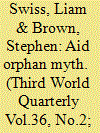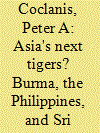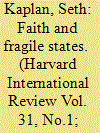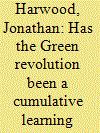| Srl | Item |
| 1 |
ID:
137727


|
|
|
|
|
| Summary/Abstract |
The term ‘aid orphan’ refers to a developing country forgotten or abandoned by the development community. This metaphor has featured prominently in the development assistance policy and research literature over the past decade. Development practitioners, policy makers and researchers have defined aid orphans in manifold ways and often expressed concern over the potential fate or impact of such countries. In this paper we first examine the many definitions of aid orphans and then review the main concerns raised about them. Next we empirically examine more than 40 years of bilateral aid data to identify aid orphan countries and their common characteristics. Our findings suggest that very few countries meet the definition of aid orphan and fewer still raise the concerns collectively expressed about the orphan phenomenon. We conclude by suggesting researchers and practitioners abandon the orphan metaphor and instead focus on issues of equitable aid allocation.
|
|
|
|
|
|
|
|
|
|
|
|
|
|
|
|
| 2 |
ID:
125207


|
|
|
|
|
| Publication |
2013.
|
| Summary/Abstract |
President Obama's post-election visit to Asia last November was a vivid reminder that America is in the process of making a strategic pivot east. That Burma was one of his destinations was good for many reasons, one of which was to remind the development community that this country is once again full of potential, as it was half a century ago. Indeed, in the 1960s Burma, along with the Philippines and Sri Lanka (then Ceylon), was seen as one of the most likely candidates in Asia to follow Japan into sustained economic growth. The fact that neither Burma nor Ceylon nor the Philippines ever quite made it-indeed, for different reasons, each became an also-ran in terms of development-is an interesting story in its own right, but a topical one too. After years of frustrated hopes and dashed expectations, each of these countries, surprisingly, has another chance to fulfill its long-stalled potential. Development delayed, it seems, is not necessarily development lost.
|
|
|
|
|
|
|
|
|
|
|
|
|
|
|
|
| 3 |
ID:
088675


|
|
|
| 4 |
ID:
121766


|
|
|
|
|
| Publication |
2013.
|
| Summary/Abstract |
Most members of the development community take for granted that policy should be evidence-based. Accordingly declarations of the need to 'learn the lessons of history' are a commonplace in the literature. At the same time there are also indications that this task is not usually taken very seriously in policy formulation. Summarising the history of peasant-friendly plant breeding from Central Europe around 1900 to the global South today, this paper argues that attempts to assist smallholder agriculture since 1945 have repeatedly failed to take into account the success or failure of earlier approaches. The evidence suggests that this neglect has been the result less of ignorance of past experience than of indifference toward it. The paper concludes by briefly considering possible reasons for this.
|
|
|
|
|
|
|
|
|
|
|
|
|
|
|
|